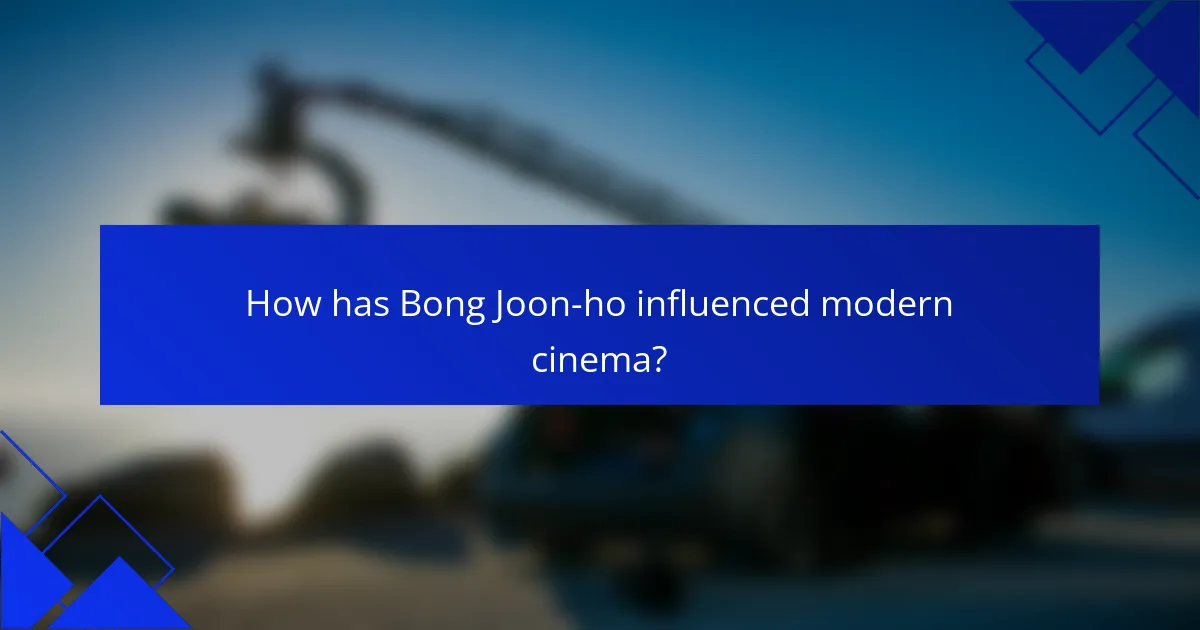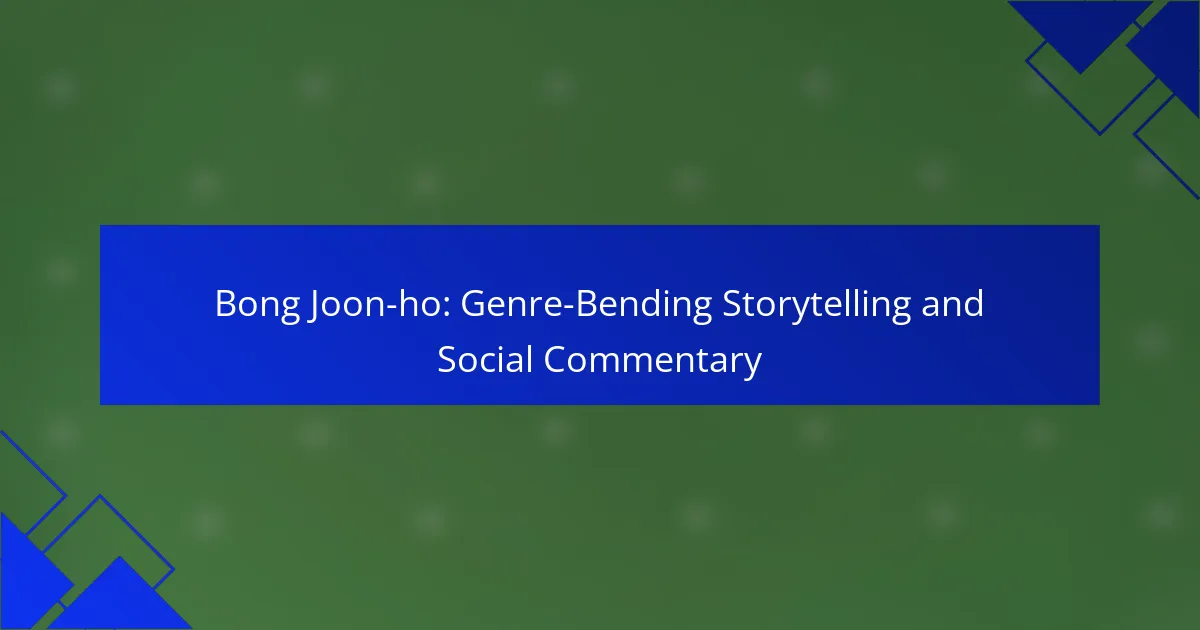
What defines Bong Joon-ho’s storytelling style?
Bong Joon-ho’s storytelling style is defined by its genre-bending elements and social commentary. He seamlessly blends various genres, such as thriller, horror, and drama, to create unique narratives. His films often explore social issues, reflecting class disparities and human behavior. For instance, “Parasite” highlights economic inequality through a darkly comedic lens. Joon-ho employs rich character development, allowing audiences to connect deeply with his protagonists. His use of visual storytelling enhances emotional impact and thematic depth. The director’s meticulous attention to detail further enriches his narratives. This combination of elements makes his work distinct in contemporary cinema.
How does Bong Joon-ho blend genres in his films?
Bong Joon-ho blends genres by integrating elements of thriller, drama, and dark comedy in his films. He often combines these genres to enhance emotional depth and social commentary. For instance, in “Parasite,” he merges suspense with humor to critique class disparity. In “Snowpiercer,” he mixes action and science fiction while addressing societal issues. His unique storytelling approach creates tension and engages viewers. This genre blending allows for a multifaceted exploration of complex themes. Bong’s films often defy traditional genre classifications, showcasing his innovative narrative style.
What are the key genres represented in his works?
Bong Joon-ho’s works prominently feature key genres such as thriller, drama, and science fiction. His films often blend these genres to create unique narratives. For example, “Parasite” combines elements of dark comedy and social commentary within a thriller framework. “Snowpiercer” exemplifies a mix of science fiction and action, exploring class struggle in a dystopian setting. Additionally, “Memories of Murder” is a crime thriller that delves into societal issues. These genre combinations enhance the depth and impact of his storytelling.
How does genre blending enhance narrative depth?
Genre blending enhances narrative depth by combining elements from multiple genres. This fusion allows for richer character development and complex story arcs. It creates unexpected twists that engage the audience more deeply. For example, combining horror and comedy can highlight societal issues while entertaining. This approach invites diverse interpretations and emotional responses. Studies show that genre-blending narratives often resonate more with audiences. They provide a unique lens through which to view familiar themes. Overall, genre blending enriches storytelling by adding layers of meaning and complexity.
What themes are prevalent in Bong Joon-ho’s films?
Bong Joon-ho’s films often explore themes of class struggle and social inequality. His works depict the disparity between the rich and the poor. In “Parasite,” the dynamics of wealth are central to the narrative. The film illustrates the lengths to which individuals go to escape poverty. Environmental concerns also feature prominently in his films. “Okja” critiques corporate greed and its impact on nature. Another theme is the critique of societal norms and expectations. In “Mother,” the story examines maternal instincts against societal judgment. His films often blend dark humor with poignant social commentary. This combination amplifies the impact of the underlying messages.
How does he address social issues through his storytelling?
Bong Joon-ho addresses social issues through his storytelling by integrating them into compelling narratives. He often portrays class disparity, environmental concerns, and systemic injustice. His films like “Parasite” illustrate the stark divide between social classes. In “Snowpiercer,” he critiques capitalism and its impact on society. He uses relatable characters to evoke empathy and provoke thought. Joon-ho’s unique blend of genres enhances the emotional weight of these themes. His storytelling invites audiences to reflect on societal issues while being entertained. This approach fosters a deeper understanding of complex social dynamics.
What role does satire play in his narratives?
Satire in Bong Joon-ho’s narratives serves to critique societal norms and injustices. It highlights the absurdity of social hierarchies and human behavior. Through humor and exaggeration, Joon-ho exposes the flaws in his characters and settings. This approach invites audiences to reflect on serious issues like class disparity and corruption. For example, in “Parasite,” satire reveals the stark contrast between wealth and poverty. The film uses dark humor to underscore the desperation of the lower class. Joon-ho’s use of satire encourages viewers to question their own societal roles. Overall, satire enriches his storytelling by blending entertainment with profound social commentary.

How has Bong Joon-ho influenced modern cinema?
Bong Joon-ho has significantly influenced modern cinema through his genre-blending storytelling and social commentary. His films often combine elements of thriller, drama, and dark comedy, creating unique viewing experiences. The film “Parasite” won the Academy Award for Best Picture in 2020, marking a historic achievement for non-English language films. This success has encouraged filmmakers to explore diverse narratives and cultural themes. Joon-ho’s work highlights social issues, such as class disparity, making complex subjects accessible to audiences. His innovative approach has inspired a new generation of filmmakers to experiment with genre and narrative structure. Additionally, his collaborations with international talent have fostered a global perspective in filmmaking.
What impact has he had on filmmakers globally?
Bong Joon-ho has profoundly influenced filmmakers globally through his innovative storytelling and genre-blending techniques. His film “Parasite” won the Academy Award for Best Picture in 2020, marking a historic moment for international cinema. This recognition has inspired filmmakers to explore unconventional narratives and social themes. Bong’s ability to merge genres, such as horror and comedy, has encouraged others to experiment with form and content. His focus on class disparity and human emotion resonates with a worldwide audience. This thematic depth has prompted filmmakers to address social issues in their work. Additionally, Bong’s unique visual style has set new standards in cinematography. His impact is evident in the rising popularity of Korean cinema on the global stage.
In what ways has his work changed audience expectations?
Bong Joon-ho’s work has significantly changed audience expectations by blending genres and incorporating social commentary. His films, such as “Parasite,” challenge traditional storytelling structures. They engage viewers with unexpected plot twists and deep character development. This approach has raised the bar for narrative complexity in cinema. Audiences now anticipate films that provoke thought and elicit emotional responses. Furthermore, his success at prestigious awards has set new standards for international films. The critical acclaim of his work has encouraged audiences to seek diverse storytelling perspectives. Overall, Bong Joon-ho has reshaped what audiences expect from modern cinema.
How does his approach differ from traditional filmmaking?
Bong Joon-ho’s approach differs from traditional filmmaking by blending genres and incorporating social commentary. He often combines elements of horror, drama, and comedy within a single narrative. This genre-bending creates a unique viewing experience that challenges audience expectations. His films, such as “Parasite,” highlight social inequalities and human behavior in innovative ways. Traditional filmmaking often adheres to a specific genre, limiting thematic exploration. Bong’s storytelling invites deeper reflection on societal issues while maintaining entertainment value. His distinctive style has garnered critical acclaim and numerous awards, including the Academy Award for Best Picture.
What are some notable films by Bong Joon-ho?
Parasite, released in 2019, is one of Bong Joon-ho’s most notable films. It won four Academy Awards, including Best Picture. Another significant film is Snowpiercer, released in 2013. This film explores class struggle in a post-apocalyptic setting. Okja, released in 2017, addresses issues of animal rights and corporate greed. Memories of Murder, from 2003, is a critically acclaimed crime thriller based on true events. Each of these films showcases Bong Joon-ho’s unique storytelling style and social commentary.
How do these films exemplify his unique style?
Bong Joon-ho’s films exemplify his unique style through their blend of genres and social commentary. He seamlessly combines elements of horror, drama, and comedy. This genre-bending approach creates a rich narrative texture. For instance, “Parasite” merges thriller and social satire. It critiques class disparity while engaging viewers with suspenseful storytelling. His use of visual metaphors enhances thematic depth. In “Snowpiercer,” the train serves as a microcosm of society. This illustrates his ability to reflect real-world issues through speculative fiction. His characters often embody moral ambiguity, adding complexity to the narrative. Overall, his films challenge conventional storytelling while addressing societal concerns.
What critical acclaim have his films received?
Bong Joon-ho’s films have received widespread critical acclaim. His film “Parasite” won the Academy Award for Best Picture in 2020. It is the first non-English language film to achieve this honor. The film also secured three additional Oscars, including Best Director for Bong. Critics have praised his unique storytelling and social commentary. His works often blend genres, which has garnered him a dedicated following. Films like “Snowpiercer” and “Memories of Murder” have received high ratings on platforms like Rotten Tomatoes. These accolades reflect his impact on global cinema and storytelling.

What can we learn from Bong Joon-ho’s filmmaking techniques?
Bong Joon-ho’s filmmaking techniques emphasize blending genres and deep social commentary. His ability to merge elements of thriller, drama, and satire creates unique narratives. For example, “Parasite” seamlessly transitions from dark comedy to intense drama. This genre fluidity engages audiences on multiple levels.
He also utilizes visual storytelling to enhance themes. The use of space and composition reflects class disparities. In “Snowpiercer,” the train’s layout symbolizes social stratification.
Moreover, Bong’s character development is notable for its complexity. Characters are often morally ambiguous, prompting viewers to question their motivations. This approach fosters deeper emotional connections.
His meticulous attention to detail in production design enriches the narrative. Each setting is crafted to reflect underlying themes. For instance, the contrasting homes in “Parasite” highlight socioeconomic divides.
Bong Joon-ho’s techniques encourage filmmakers to explore societal issues through innovative storytelling. His work demonstrates the power of cinema to provoke thought and discussion.
What best practices can aspiring filmmakers adopt from his work?
Aspiring filmmakers can adopt several best practices from Bong Joon-ho’s work. First, they should embrace genre-blending techniques. Joon-ho successfully merges various genres, creating unique narratives. Second, filmmakers should focus on strong character development. His characters often embody complex motivations and moral dilemmas. Third, incorporating social commentary is essential. Joon-ho’s films address societal issues, making them relevant and thought-provoking. Fourth, meticulous attention to visual storytelling is crucial. His use of composition and cinematography enhances the narrative impact. Fifth, filmmakers should prioritize collaboration with a talented team. Joon-ho’s partnerships with writers, actors, and crew elevate his projects. Lastly, maintaining a distinct voice is important. Joon-ho’s unique style sets his films apart in the industry. These practices can significantly enhance the quality and impact of aspiring filmmakers’ projects.
How can genre-bending enhance storytelling in their projects?
Genre-bending enhances storytelling by combining elements from multiple genres. This approach creates unique narratives that engage audiences in unexpected ways. It allows creators to explore complex themes more deeply. For example, Bong Joon-ho’s films often blend horror, drama, and comedy. This fusion can highlight social issues while entertaining viewers. Genre-bending also keeps the audience guessing, increasing emotional investment. It challenges conventional storytelling structures, encouraging innovative plot development. Ultimately, this technique enriches the storytelling experience by offering fresh perspectives.
What strategies can be used to incorporate social commentary effectively?
Effective strategies for incorporating social commentary include using relatable characters, employing humor, and creating emotional resonance. Relatable characters help audiences connect with the themes presented. Humor can disarm viewers, making serious topics more approachable. Emotional resonance engages audiences on a deeper level, prompting reflection and discussion. Additionally, utilizing visual metaphors can convey complex ideas succinctly. Historical context enhances the commentary’s relevance, grounding it in reality. Bong Joon-ho’s films exemplify these strategies, effectively addressing social issues while entertaining audiences. For instance, “Parasite” uses class disparity to spark critical conversations about societal structures.
What resources are available for studying Bong Joon-ho’s films?
Resources for studying Bong Joon-ho’s films include academic journals, film analysis books, and online databases. The Journal of Korean Studies features articles on his filmography. Books like “Bong Joon-ho: Interviews” provide insights into his creative process. Online platforms such as JSTOR and Google Scholar offer access to research papers. Film critique websites, including IndieWire and The Film Stage, analyze his works in depth. Documentaries about his filmmaking style can also be found on streaming services. Additionally, film festivals often host retrospectives of his films, providing context and expert discussions.
Where can one find analyses and critiques of his work?
Analyses and critiques of Bong Joon-ho’s work can be found in academic journals, film review websites, and books dedicated to cinema studies. Notable sources include the Journal of Film and Video, which features scholarly articles on his films. Websites like RogerEbert.com provide in-depth reviews and critiques. Additionally, books such as “Bong Joon-ho: Interviews” offer insights from the director himself and analyses from critics. These resources collectively cover his unique storytelling techniques and social commentary in films like “Parasite” and “Snowpiercer.”
What educational materials are recommended for deeper understanding?
Books and articles on Bong Joon-ho’s films are recommended for deeper understanding. “Bong Joon-ho: Interviews” provides insights into his creative process. The book “The Films of Bong Joon-ho” offers critical analysis of his work. Academic articles in journals like “Film Quarterly” explore themes in his films. Documentaries about his filmmaking techniques enhance comprehension. Viewing his films alongside these materials deepens appreciation of his genre-bending style. Engaging with critiques and reviews further contextualizes his social commentary.
Bong Joon-ho is a prominent filmmaker known for his genre-bending storytelling and social commentary. His works, including “Parasite,” “Snowpiercer,” and “Memories of Murder,” often blend genres such as thriller, drama, and dark comedy while addressing themes of class struggle and social inequality. This article explores Joon-ho’s unique narrative techniques, the impact of his films on modern cinema, and the strategies aspiring filmmakers can adopt from his approach. Additionally, it highlights the critical acclaim his films have received and provides resources for further study of his work.
